- Home
- Lisa Gardner
The Detective D. D. Warren Series 5-Book Bundle Page 11
The Detective D. D. Warren Series 5-Book Bundle Read online
Page 11
“It doesn’t matter anymore,” she said at last.
“Guess not.” Her father drank some water.
“There’s an issue though. The Gagnons, Jimmy’s parents, are suing me for custody of Nathan.” She brought up her chin. “They claim I’m abusing him.”
Her father didn’t say anything right away. He drank more water, then twisted the cloudy plastic cup in his hands, then drank some more. The silence dragged on. Catherine grew bewildered. Where was the wild denial? Where was the leap to his daughter’s defense? Sixty seconds ago he’d been claiming she could’ve turned to him for help for her broken marriage. Now where was he?
“The illnesses?” her father asked at last.
“They claim I’m doing something to Nathan, tampering with his food, I don’t know what. They think I’m intentionally making him sick.”
Her father looked up. “Are you?”
“Dad!”
“He’s in the hospital a lot.”
“He’s sick!”
“Doctors never found anything.”
“He has pancreatitis! Right now. Call Dr. Rocco, call anyone in that damn place.” She was on her feet. “He is my son! I have jumped through every hoop I know trying to do right by him. How can you … How dare you! Goddammit, how dare you!”
She was yelling now, literally yelling, like a wild woman, with the veins bulging in her neck, and it occurred to her in the back of her mind that this was what she’d wanted to do for days. Ever since Tuesday morning, when she had picked up the phone and heard Jimmy casually discussing with some lawyer his plans to divorce her.
“You’re sure she won’t get anything?” he’d asked the lawyer. “I don’t want her touching one red cent.”
“No Nathan, no money,” the lawyer had assured him. “It’s all taken care of. I can file the paperwork within the hour.”
“I love my son!” she screamed at her father now. “Why doesn’t anyone believe that I love Nathan?”
And then she broke. Her legs gave out. She collapsed on the horrible brown sofa, her shoulders heaving, a strange hiccupping sound coming from her throat. She couldn’t find herself. She was lost, drowned in some would-be moment, where Jimmy had left her and Nathan had left her and she was back in her rat-infested apartment, no family, no money, all alone. A blue Chevy would turn down the street. A hole would open in the ground. There would be nothing to save her anymore.
Her father was still sitting across from her. He had his gaze locked intently on the portrait of her mother. That finally gave her strength. She pulled herself together, wiping the back of her hand across her dry eyes.
“Will you support me?” she asked quietly.
“You need money?”
“No, Dad.” Her voice grew terse again. She forced herself to speak calmly, as if explaining to a child. “There’s going to be a hearing. A custody hearing. I met with my lawyer this afternoon. The Gagnons will bring in witnesses to testify that I’m a bad mother. I need my own witnesses who will say I’m a good mother. Or at least,” she amended, “that I’m not a threat to Nathan.”
“Where is Nathan now?”
“He’s in the hospital. He has pancreatitis.”
“Shouldn’t you be there?”
“Of course I should be there!” She tried taking another deep breath. “But I’m here, Dad, talking to you about Nathan’s future, because despite what anyone might think, I don’t want to lose my son.”
“The Gagnons aren’t bad grandparents,” he said.
“No. In their own way, I’m sure they love Nathan.”
“He’s all they have left now.”
“He’s all I have left, too.”
“I think they would provide for him,” her father said.
Catherine blinked her eyes, feeling slightly delirious. “I would provide for him, too.”
Her father finally looked at her. She was startled by the anguish she saw in his face. “You used to be such a happy child.”
“Dad?”
“I got out the home movies. I was cleaning out the attic, going through some stuff. I’m getting some arthritis, you know; it’s tough to mount the stairs. So I thought I’d better get to those boxes, get them cleaned out while I still can. I found the old reel-to-reels. Watched them last night.”
She couldn’t say anything. Tears glistened in her father’s eyes.
“You were so pretty,” he whispered. “Your hair back in a ponytail, tied with a big red bow. Your mother used to comb it out for you every morning and you’d pick a ribbon for the day. Red was your favorite, followed by pink.
“You were in the backyard. Your birthday, I think, but I didn’t see a cake. Other kids were over and we had filled the kiddie pool. You were laughing and splashing in the water, shrieking when I turned on the hose.
“You were laughing,” he repeated now, almost helplessly. “Catherine, I haven’t seen you laugh in over twenty years.”
Her chest went tight. She thought she should say something. She ended up shaking her head, as if to deny his words.
“Your mother loved you so much.” He stood abruptly and turned away from her. “I’m glad she’s dead. I’m glad she didn’t live to see what would happen next.”
“Dad—”
“You’re not right, Catherine. You came back to us; God knows we considered ourselves grateful to get you back from that hell. But you’re not right. In the end, our little girl died that day, and I don’t know who’s standing in front of me now. You don’t laugh anymore. Sometimes, I’m not sure you feel anything at all.”
She shook her head again, but he was nodding emphatically, as if arriving at some destination at the end of a very long trip. He turned back around. He looked her in the eye.
“You should let them have Nathan.”
“He’s my son.”
“They have a lot of money, they’ll take good care of him. Maybe they can even find him the right doctor.”
“I’ve been trying to find him the right doctor!”
Her father spoke as if he’d never heard her. “They can get him counseling. That’s probably what we should’ve done.”
Catherine rose to her feet. “You’re my father. I’m asking for your support. Will you give it?”
“It’s not the right thing to do.”
“Will you give it!”
He reached out as if to take her hand. She frantically snatched it back. And he smiled at her sadly. “You were a happy child,” he said quietly. “Maybe it’s not too late. Maybe if you get the right help, you can be happy again. That’s all your mother wanted, you know. Even once she got cancer. She never prayed to live. She always prayed just to see you smile once more. But you never did, Catherine. Your mother was dying, and you still couldn’t grant her that tiny little curve of the lips.”
“You’re mad at me? Is that what this is about? You’re pissed off at me because I couldn’t smile while my mother was dying? You … you …”
She couldn’t speak. She was beyond words, stupefied by shock and rage. If she could just find the mantel, she could get a grip on the wooden trim and anchor herself. In the next instant, however, she had a clear image of her hand wrapping around the brass candelabra there and using it to bash in her father’s head.
In her own detached way, she wasn’t sure what surprised her more: the depths of her grief or the strength of her fury.
“Thank you for your time,” she heard herself say. She brought her hands to her sides. She forced them to open. She breathed in, breathed out. The calm returned to her. Icy, yes. Barren. But better for her, better for her father, than any genuine emotion could ever be.
Catherine got her coat and very carefully moved toward the door.
Her father stood in the doorway behind her, watching her go down the steps, watching her walk to her car. He raised a hand in parting, and the sheer casualness of the gesture made her dig her teeth into her lower lip to keep from screaming.
Moving with practiced precision, she put her
sedan in reverse and slowly backed out of the driveway. Put on the brake, shift to drive, find the gas. She took off down the street, driving too fast and still pursing her lips into a bloodless line.
She needed support. Her lawyer had been very clear. Without some kind of help, the Gagnons would win, they would take Nathan from her. Most likely, she would never see him again.
She would be all alone. And she would be broke.
Oh God, what was she going to do?
She was scattered. Distracted. Desperately searching for answers. That’s why she didn’t see it, of course. Not until the third or fourth intersection down. Then she finally glanced up, finally looked into her rearview mirror.
Someone had used her own lipstick to do it; she’d left it lying on the console between the seats. It was her favorite OPI color, a deep crimson, the color of a Valentine’s Day rose, or fresh-spilled blood.
The message was simple. It read: Boo!
Chapter
13
Bobby went home. He had about thirty messages on his answering machine. Twenty-nine were from bloodsucking reporters, each and every one promising to tell his side of the story in return for an exclusive—did I mention exclusive?—interview. The thirtieth was from his LT, inviting him over for dinner.
“Come on over,” Bruni extolled into the answering machine. “Rachel’s roasted half a cow and is serving it with ten pounds of mashed potatoes. We’ll eat too much, make rude bodily noises, and shoot the shit. It’ll be fun.”
Bruni was a good guy. He looked out for his team, kept them all together. He meant the invitation sincerely and Bobby should go. It’d be good for him, get him out of the house, keep him out of further trouble. He already knew he wouldn’t.
He walked away from the blinking machine, into his tiny kitchen. He opened the refrigerator door, eyed the empty interior.
He wanted to call Susan. Say … what? I’m a jerk. I’m an ass. Worse, I’m a killer. None of it sounded promising. None of it changed anything.
Pizza, he thought. He’d walk to the local pizza parlor, order himself a pie. But thoughts of pizza made him think of beer. And thoughts of beer suddenly had his heart racing and his mouth salivating.
Yeah, that was it. Screw his kindhearted LT. Screw too-perfect Susan. Screw even dark and dangerous Catherine Gagnon, who’d raked her nails across his chest and made him pant like an overeager lap dog. Fuck ’em all. He didn’t need people.
He needed a beer.
It occurred to him, in the last functioning spot in his brain, that if he didn’t do something now, right now, he was going to end up at a bar. And once he did, he was going to drink.
Bobby picked up the phone. He made a call. Then, before he had time to regret it, he headed out the door.
Dr. Lane buzzed him straight up to her office. Last time he’d seen her, she’d been wearing a suit. Tan pants, squarish jacket, some kind of ivory blouse. Expensive clothes, he’d guessed, but he hadn’t cared for the outfit. Looked too mannish, like what a corporate woman with a chip on her shoulder might wear to board meetings. The outfit hadn’t gone with her smile.
Tonight, called out on a Saturday to rescue an officer in distress, she wasn’t wearing business clothes at all. Instead, given the frigid cold, she’d donned dark brown leggings and a warm, cable-knit Irish sweater that curled up around her neck and set off her long, chestnut-colored hair. She looked like she should be lounging in front of a large stone fireplace with either a good book or a good-looking man.
The image momentarily discomfited Bobby and he found he couldn’t make eye contact as he unwound his scarf and hung up his jacket.
“Can I get you something to drink?” she asked, from the doorway of her office. “Water, coffee, soda, hot chocolate …”
He went with Coke, refusing her offer of a glass. She took a seat behind her desk. He returned to the wingback chair he’d used on Friday night, balancing on the edge.
“Thanks for the Coke,” he said at last.
“You’re welcome.”
“Sorry if I messed up your plans.”
“Not a problem.”
“Did you have plans?” he found himself asking.
“I was thinking of going to a nursery and buying a ficus tree.”
“Oh,” he said.
“Oh,” she agreed.
“What about during the day?” he continued like an idiot. “Do anything then?”
She regarded him with open amusement. After his complaint during their last session, he was now using small talk as a stall tactic and they both knew it. For a moment, he thought she might call his bluff, force him to cut to the chase, but then she answered his question. “Honest to God, I did nothing interesting today. Thought about running, decided it was too cold. Thought about cooking, decided I was too lazy. Thought about reading a book, decided I was too sleepy. So mostly, I spent the day contemplating life, then ignoring it. All in all, I’d say it was a perfect day. And yourself?”
“I spent the day ignoring your advice.”
“Ah well, not the first time. What did you do?”
He decided he might as well get to it. “Last night I went to a bar.”
She regarded him expectantly.
“I ended up drinking.”
“A lot?”
“Enough.” He took another breath. “I’m not supposed to drink.”
“Are you an alcoholic, Bobby?”
“I don’t know.” He had to genuinely consider her question. He wasn’t sure he liked the answer. “Life is better when I don’t drink,” he said at last.
“I take it you’ve had some experiences in this area.”
“You could say that.” He spun the soda can between his fingers. From the distance, her carpet appeared a rich, dark green. He could see now that it wasn’t one color, however, but a mixture of many, many threads. Not just green, but giving the appearance of green.
“My father used to drink,” he said. “A lot. Every night. Came home from work and headed straight to the fridge to grab a cold one. He said it helped him unwind. What’s a few beers after all? Nothing hardcore. My brother and I were just kids. We believed what he said. Though after a while, we all knew it wasn’t just a few beers anymore.
“After I joined the Academy, I started doing the post-shift bar scene. Hanging out with the guys, having a few laughs, drinking a few beers. You know, because it helped me unwind. And maybe at one point, I wasn’t having just a few beers anymore. Maybe I was having a lot. So many I was showing up late for my shifts the next day. Then one night, I got a call. A buddy of mine had just arrived at the scene of a single-vehicle accident. It involved my father and a tree. In the bad-news department, my father had nailed the sucker going a good forty miles an hour, wrapped his GM truck right around the beech tree. In the good-news department, my father walked away with just a lacerated scalp. Truck was totaled, but he survived.”
Bobby glanced up from the carpet. “My father was drunk. Blew a point two on the breathalyzer. No way he should’ve been behind the wheel of a vehicle; he was goddamn lucky a piece of wood was the only thing he hit. That night scared him shitless. Scared me, too. Kind of like one of those TV commercials: Here’s your life. Here’s your life with too much booze.
“So we made a pledge. I told him I wouldn’t drink anymore if he wouldn’t drink anymore. I figured I was doing it to help him. I’m kind of guessing he felt he was doing it to help me.”
“And it worked?”
“As far as I know, for nearly ten years we’ve both stuck to it. Until last night.”
“So why last night, Bobby?”
He said levelly, “I could say it was because guys were buying me beers. I could say it was because for the first time in years, I wasn’t on call, so I was allowed to have a drink. I could say because after ten years, how much could one beer really hurt? I could say a lot of things.”
“But you’d be lying?”
“I keep seeing his face,” Bobby whispered. “Every time I close
my eyes, I see his face. I did my job, dammit.” He hung his head. “Jesus, I didn’t think it would be this hard.”
She didn’t say anything right away. The words just hung there, gathering a weight of their own. He finally brought the Coke to his lips and swallowed. Then he looked up at the ceiling, above the dark paneling of mahogany wood trim, and there was Jimmy Gagnon as clear as daylight. One white male subject holding a gun on his wife and kid. One white male subject appearing genuinely surprised as Bobby’s 165-grain bullet slammed into his skull. Do you know how a dead man looks? Startled.
Do you know how other people regard that man’s killer? With admiration, pity, and fear.
“Are you thinking of drinking again?” Elizabeth asked quietly.
“Yeah.”
“Do you think joining an AA group might help?”
“I don’t like talking to strangers about my problems.”
“Do you think talking to your father might help?”
“I don’t like talking to my father about my problems.”
“Then who can help you, Bobby?”
“I guess just you.”
She nodded thoughtfully. “There is something you should know,” she said after a moment, “before we go any further.… I have some previous involvement in this case. I’ve met with Judge Gagnon.”
“What?”
“He wasn’t my patient.”
“The hell you say.” Bobby flew out of his chair. He gazed at her wildly; he couldn’t believe this. “Isn’t that a conflict of interest? How can you do that? One day you’re listening to one guy’s problems, the next you’re counseling the guy who’s suing him?”
Dr. Lane held up a hand. “The judge came to me for a professional opinion. I met with him for thirty minutes. Then I referred him to an associate who I felt would be better able to assist him.”
“Why? Why did he come to you? What did he want to know?” Bobby leaned over her desk, jaw clenched, arm muscles bulging. He was pissed as hell, and he knew it showed on his face.
Elizabeth continued to regard him evenly. “I spoke to Judge Gagnon last night. With his permission, I will share with you what we said. I’m warning you now, however, I don’t think it will help.”

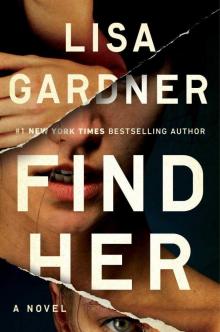 Find Her
Find Her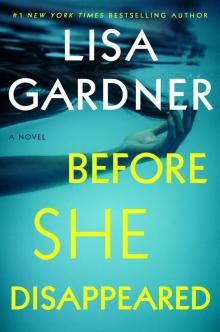 Before She Disappeared
Before She Disappeared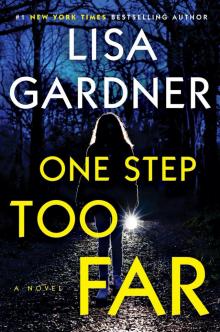 One Step Too Far
One Step Too Far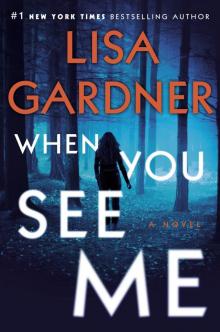 When You See Me
When You See Me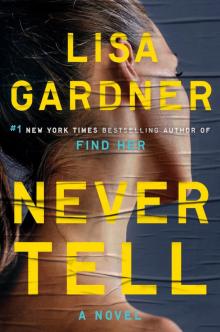 Never Tell
Never Tell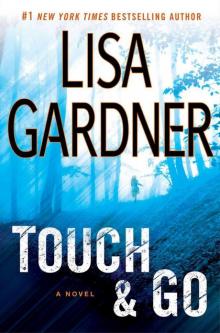 Touch & Go
Touch & Go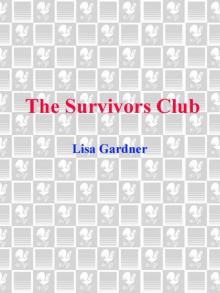 The Survivors Club
The Survivors Club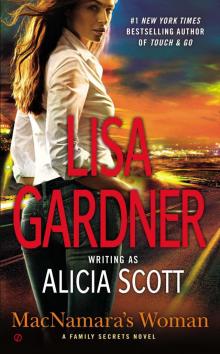 MacNamara's Woman
MacNamara's Woman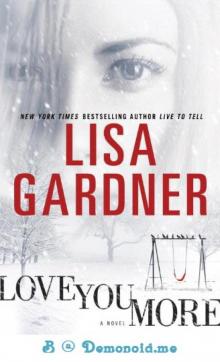 Love You More: A Novel
Love You More: A Novel Gone
Gone The Perfect Husband
The Perfect Husband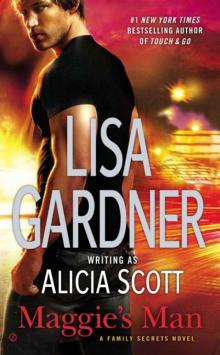 Maggie's Man: A Family Secrets
Maggie's Man: A Family Secrets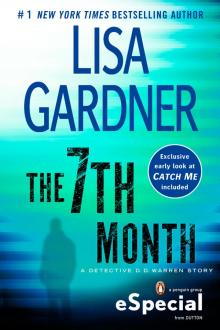 The 7th Month
The 7th Month The Neighbor
The Neighbor Hide
Hide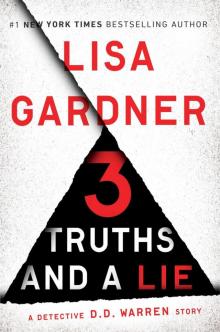 3 Truths and a Lie
3 Truths and a Lie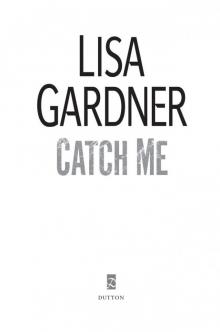 Catch Me
Catch Me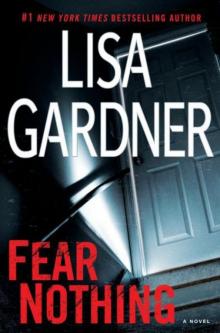 Fear Nothing: A Detective
Fear Nothing: A Detective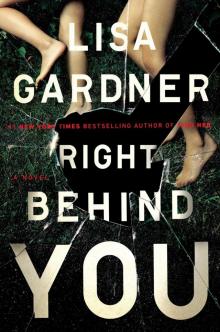 Right Behind You
Right Behind You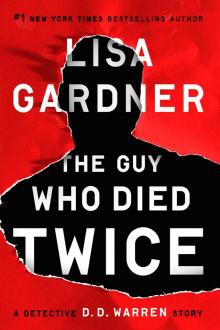 The Guy Who Died Twice
The Guy Who Died Twice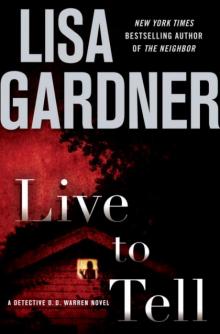 Live to Tell: A Detective D.D. Warren Novel
Live to Tell: A Detective D.D. Warren Novel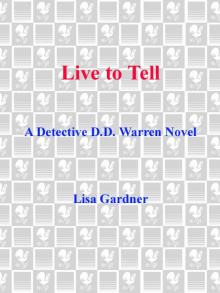 Live to Tell
Live to Tell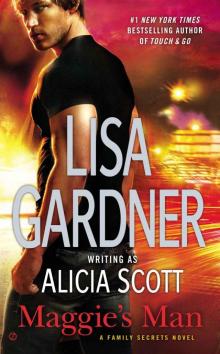 Maggie's Man: A Family Secrets Novel
Maggie's Man: A Family Secrets Novel The Other Daughter
The Other Daughter Alone
Alone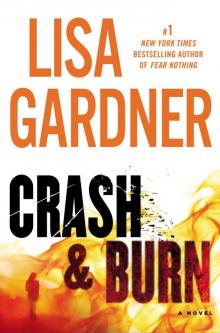 Crash & Burn
Crash & Burn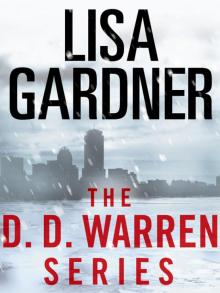 The Detective D. D. Warren Series 5-Book Bundle
The Detective D. D. Warren Series 5-Book Bundle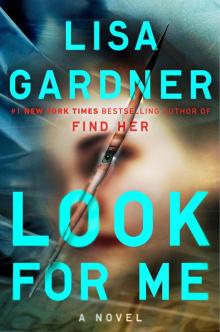 Look for Me
Look for Me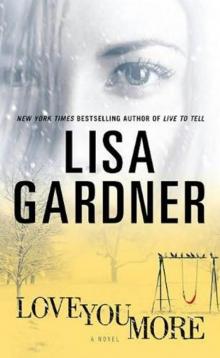 Love You More
Love You More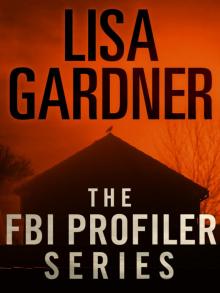 The FBI Profiler Series 6-Book Bundle
The FBI Profiler Series 6-Book Bundle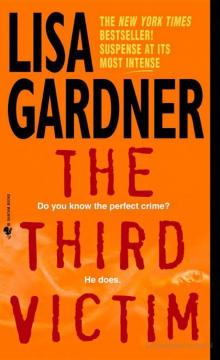 The Third Victim (Quincy / Rainie)
The Third Victim (Quincy / Rainie) Say Goodbye
Say Goodbye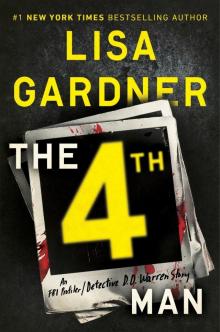 The 4th Man
The 4th Man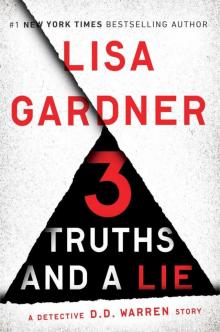 3 Truths and a Lie: A Detective D. D. Warren Story (Kindle Single)
3 Truths and a Lie: A Detective D. D. Warren Story (Kindle Single)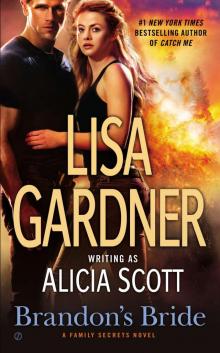 Brandon's Bride
Brandon's Bride